In a landmark decision, Brazil’s Superior Court of Justice (STJ) ruled that cryptocurrencies can be seized to settle outstanding debts, marking a significant development in the country’s approach to digital assets. This ruling allows courts to recover debts through digital assets like Bitcoin and Ethereum, treating them similarly to conventional property like cash or real estate.
A New Precedent in Digital Asset Accountability
The STJ’s 3rd Panel, composed of five members, unanimously supported a creditor’s request to freeze and report digital assets held by an individual with unpaid debts. The decision confirms that cryptocurrencies can be used as a form of payment and a store of value and can be treated like other types of property in legal debt collection. As stated by the court, “Although they are not legal tender, crypto assets can be used as a form of payment and as a store of value.”
Implications for Cryptocurrency Regulation in Brazil
The ruling highlights the need for more explicit crypto regulations in Brazil. While the country has started recognizing digital assets, no complete legal framework remains. The decision may prompt lawmakers to accelerate efforts to establish clear and comprehensive guidelines on how cryptocurrencies fit into the country’s financial system.
Current State of Cryptocurrency Regulation in Brazil
Minister Ricardo Villas Bôas Cueva noted that although cryptocurrencies are not fully regulated in Brazil, proposed legislation already defines digital assets as a “digital representation of value.” This classification reinforces their legitimacy in legal and financial matters. However, it’s important to note that Brazil’s National Council of Justice (CNJ) is also working on CriptoJud, which allows courts to freeze or seize crypto assets directly from users’ accounts at exchanges. This indicates that Brazil is making significant strides toward regulating cryptocurrencies.
Impact on Debt Recovery and Cryptocurrency Adoption
The STJ’s decision may alter how debts are recovered in Brazil, providing courts with a new means of enforcing payments. This could increase confidence in using digital assets for business and personal purposes. However, it also underscores the need for more explicit regulations to ensure cryptocurrency’s secure and transparent use.
Conclusion
The recent ruling by Brazil’s Superior Court of Justice marks a significant step towards recognizing the value and legitimacy of cryptocurrencies in the country’s financial and legal systems. As Brazil continues developing its cryptocurrency laws, this decision sets a clear precedent for treating digital assets in debt collection and enforcement. With the potential for increased adoption and regulation, Brazil is poised to become a leader in the Latin American cryptocurrency market, offering hope for a more robust and secure financial future.

